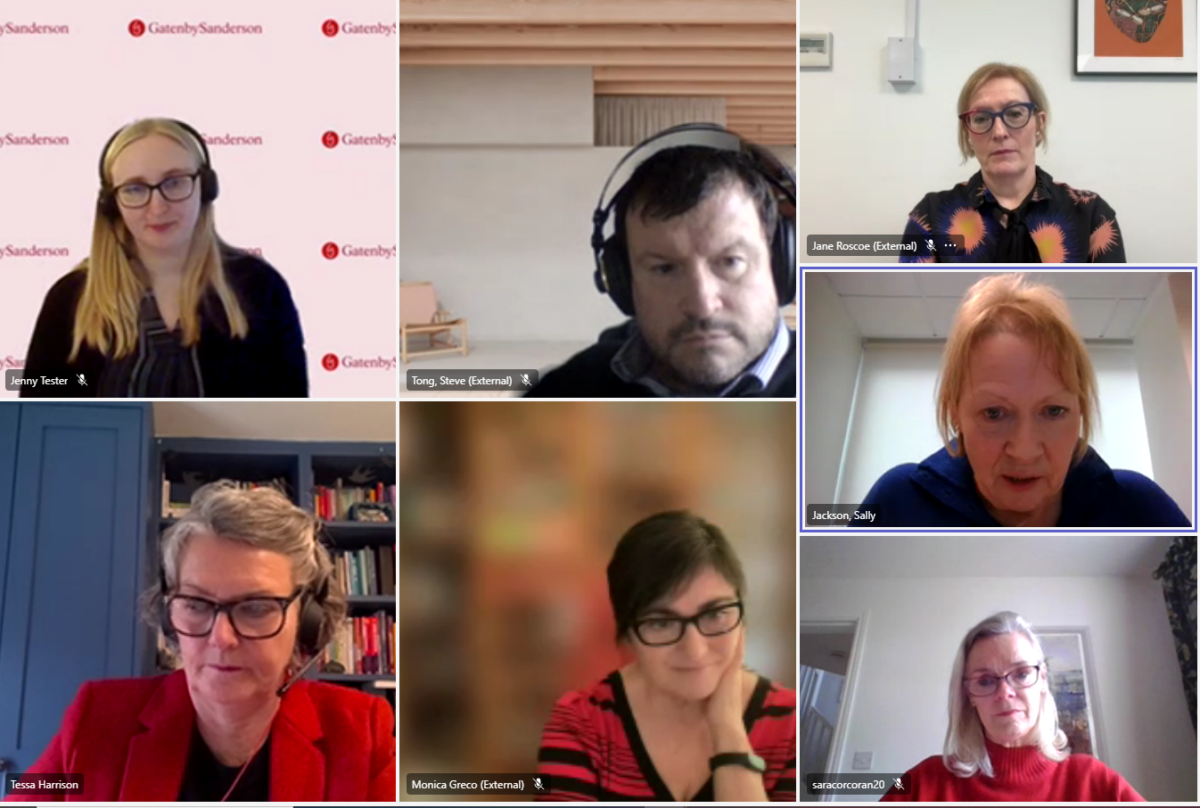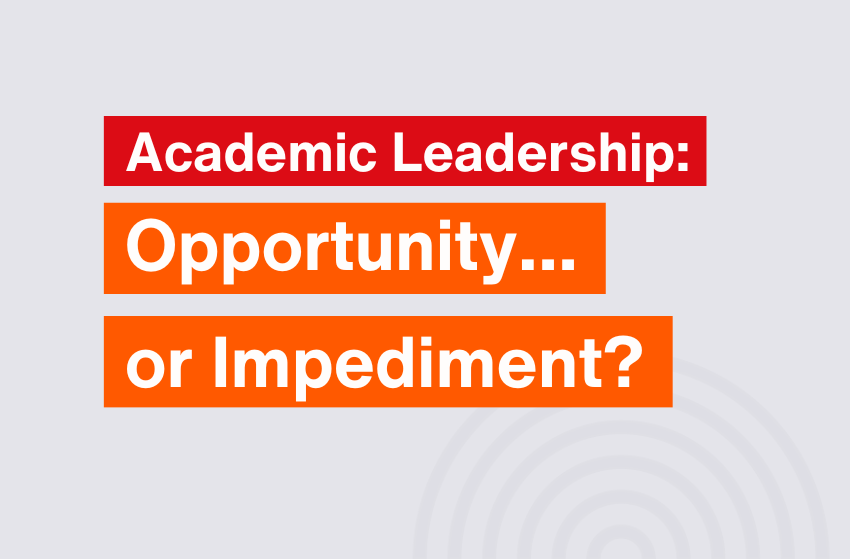Our recent panel discussion Academic Leadership: Opportunity or Impediment was hugely popular. Academics and leaders across Higher Education came together to discuss the ‘Head of’ role, its challenges, perceptions, opportunities and rewards.

Our panellists answered a range of questions from those who attended live, however, there were some we didn’t have time to get to. Professor Steve Tong, Professor Sally Jackson and Sara Corcoran have share their answers to these unanswered questions below.
What was your biggest surprise about the role in the first few weeks and months?
Steve: The support and friendliness from colleagues in my new institution. They could not have been more helpful. Kingston is a very friendly place to work.
What has changed for you since taking up post?
Steve: I believe I have learned a lot more about strategy and the challenges of leadership. The sector has also become a lot more challenging very quickly.
How could someone manage the (sometimes less than positive) reactions of colleagues when you step into this (rotational) role and when you are going back?
Sara: I think we need a longer term cultural change initiative here – something that properly builds understanding and shared ownership of the department/school’s context, which would help mitigate the steep learning curve of those stepping into these roles, but also help colleagues be a little more compassionate to those who are in the roles (and stepping out of them).
In the meantime, I’d repeat the advice that was given in the session – keep talking to them, try to understand what is behind their behaviour, be authentic and truthful – and learn to accept that you’re not always going to win people over, and it may actually have nothing to do with you!
Steve: I think you need a clear philosophy to your leadership and that you seek out to be genuinely accountable and accessible. You can defend your decisions when going back if you have good foundation and solid principles to your approach. If you have genuinely encouraged colleagues to come forward with their views, and listened to them, and made decisions on the best information available you have a solid basis to make decisions.
Decisions must be made with the best interests of departments, schools, and the university in mind. Not everyone will like it but if you have made decisions with good intentions, it is better than making no decision at all. If you can respond to less positive reactions in this way, I think it illustrates a solid approach which is hard to oppose.
Sally: The joys of being a leader! Take these reactions head on and consider what the issues really are. Perhaps its jealousy? As I said during the session, a rotational Head of Department in a Russell Group Higher Educational Institution post-1992s have permanent tenure. This makes the role tenure five years (effectively) with years one and five being mentored and then being a mentor at the end which helps. Regardless, on taking up the position, be sure to secure your research time as a sabbatical on returning so that you can catch up. And, try not be worried about colleagues’ perception.
Several speakers mentioned developing their voices. Did you consciously take steps to develop this or on reflection can you highlight any opportunities that aided this?
Steve: Yes, I wanted the school to be one where staff come forward with their ideas and challenges could be heard. You can create structures to be inclusive and accessible to create the approach and voice you want to promote.
Sally: My thesis looked at this. The power of the inner voice telling someone that they cannot do something is immense and this can affect the outer voice. Power, presence and impact are so important. It’s all about self-presentation and impression management.
What should institutions put in place to support newly appointed Heads of Department?
Sally: A quality induction is key. Then, having a bespoke development programme with coaching if affordable, but certainly mentoring if not. Finally there’s a requirement for open and honest discussions during induction from the line manger on what were perceived as the strengths and development areas in interview. Everyone has them; now is the time to develop those areas and be open and honest about that.
Sara: A thorough and meaningful handover with the out-going head. An induction programme that provides space for people to build a network of other new heads and share their challenges; explore how they want to enact the role and the impact it will have on other personal and professional roles (and what reasonable boundaries they may need to establish); an introduction to the professional service staff who will support them and time to ensure they have a mutual understanding of the agenda (as handed over by the outgoing HoD); a clear calendar of key HoD activities so they don’t come as a surprise and can be factored into the diary.
What are the fundamentals for OD and LD professionals supporting academic leaders?
Sally: I think this is about ensuring the correct Skills, Knowledge, Experience and Attitude (behaviour or competencies). You need all four once at a certain level however if someone has the right attitude, that trumps the other three in my opinion. The fundamental skills that people need development in are: People management; Financial management; Project management.
Sara: Perhaps controversially I think we need to rethink the role. Too many people are simply wiped out after a term of office and need time away, not just so that they can reconnect with their research, but often as not, just to decompress. It shouldn’t be acceptable that we have jobs that do this to people. In rotational systems, I think it would be helpful if we built preparation for the role throughout career development plans – as well as then having some more of the knowledge and skills, it would also make this aspect of academic life much more acceptable, rather than taking on a management role still being something considered rather distasteful, or a necessary evil, by too many academic colleagues.
I think we need to rethink induction programmes – although some do start before taking up the role, most align with the start dates, so the new incumbent is completely overwhelmed before they get to realise any value from the induction support. Also, many experience the content as relays of professional services staff telling them what they need from the new HoD, or running at pace through various processes that now need to be understood and complied with. What they find more helpful are conversations that help them understand what the professional service staff (and more senior academic colleagues) can do to support them and some time to properly understand the issues and constraints, shape the plan of next steps. We need honest conversations about some of the enduring tensions and we need ways to help new HoDs engage their colleagues with these.
Finally, I think we need better ways to help those stepping out of the role to help them reflect on what they’ve achieved, how the experience, knowledge and skills will feed forward into their next steps and what those might be.
Please could the panel share any tools, information sources or strategies they use to make sure they keep up to date with what is happening in the sector and the implications for institutions and departments?
Steve: I think professional networking is really important at a disciplinary level and a management/leadership level. This networking is important within and outside your institution.
I also read the Times Higher, Wonkhe and Higher Education Policy Institute.
Sally: I’d recommend Wonkhe; HEPI; UUK; AUDE; AHUA; Newspapers; UKRI; Advance HE; ACU. Ask your VC and senior leaders what they do and seek opportunities to attend with them.
Sara: WonkHE is excellent. Times Higher also good. HEPI definitely worth keeping an eye on for reports/commentary.
Thanks again to all our panellists and everyone who took part live. If you didn’t sign up or missed the replay of Academic Leadership: Opportunity or Impediment – please email us to receive a copy. You can also view details of our Academic Leadership Masterclasses here.
